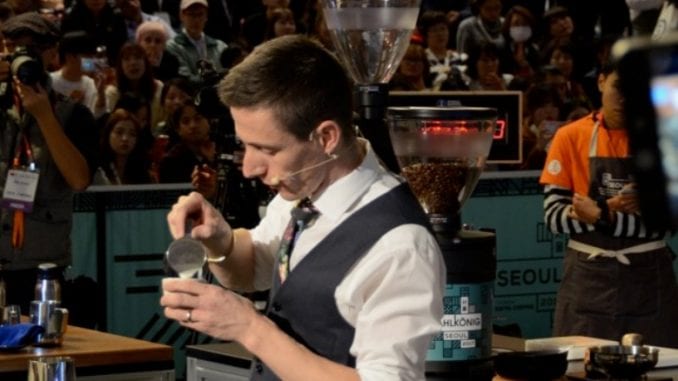
Ben Put has competed in four World Barista Championships—and he wants to share with you all the lessons he’s learned. The fourth-place finisher at the 2017 WBC talks about being a new parent and a new roaster, and taking part in his final competition.
BY ASHLEY RODRIGUEZ
BARISTA MAGAZINE ONLINE
Photos by Kenneth Olson
Ben Put had a cheering section at this year’s World Barista Championship only matched by the hometown competitor from South Korea—pretty much any Canadian baristas and coffee professionals at the event were in the stands, cheering him on and wishing for his success. And once you meet Ben—whom I met at this year’s United States Barista Championship in April after he asked me if I knew anyone he could help coach, mentor, or even just wash dishes for—you understand why. In this interview, we learn more about how Ben got into coffee, how he balanced fatherhood and competition, and what he hopes to see in the future for competition.
Ashley Rodriguez: Could you tell us a little more about your coffee background? How did you get into coffee? How did you go from getting your start in coffee to owning a coffee shop?
Ben Put: I have been a barista for the last 14 years. Coffee was a very slow transition for me. I started working at a coffee chain while I was completing a music degree. I didn’t care much about coffee because it never tasted good to me, but I learned how to pour latte art and this sustained my interest in the job. I moved to Calgary and started to work in specialty shop. I gradually got more and more interested in coffee and started to take on more responsibility in the business. By the time I started Monogram with Justin and Jeremy, I had been a barista, manager, trainer, and roaster.
I actually never wanted to own a coffee shop because I thought that it would detract from my ability to focus only on coffee. I did not know at the time how owning a business would force me to learn and grow, and introduce me to so many staff and customers that I now consider close friends.
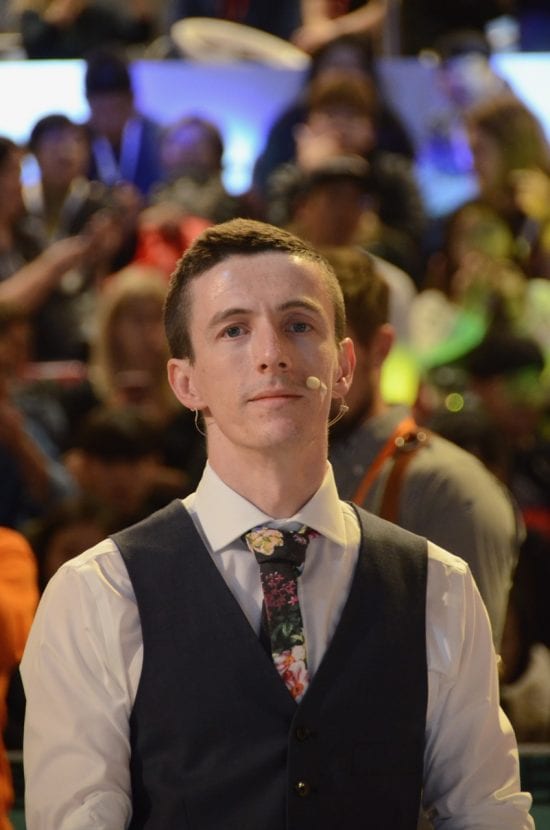
AR: I heard you just started roasting coffee, right?
BP: Starting a roastery is like starting an entirely new business in a different field. Even though cafés and roasteries both deal with coffee, they are so different that it really felt like we were starting at the beginning. That said, it has been a blast. We knew we wanted to roast when we started Monogram, but just didn’t know the timeline. Roasting is incredibly rewarding because it lets you tighten your feedback loop, but so frustrating because so much of it is a mystery to us still.
Juggling competition and business has always been hard. Justin and Jeremy, my business partners, have always been supportive. This year I practiced at night and spent a lot more time visualizing things and practicing away from the espresso machine (usually because there wasn’t one around). The parenting part I still haven’t completely figured out, but thankfully my son, Malcolm, is one of the most chill, patient, and happy babies ever. He came to Moscow and Korea this fall and was teething during WBC!
AR: Can you tell us a little about your routine and what inspired your theme?
BP: My routine focused on how variety and process can work together–especially as it relates to naturals. There are many people in coffee who believe that natural processing masks variety. Naturals are commanding more interest and money, which means more time, care, research, and money are being invested in them, and they are getting better! This means less bad fermentation flavors and more variety-based flavors that are revealed in a new way through natural fermentation. My time at origin inspired this theme. I tasted Gesha processed many different ways, and each I tasted I was still able to identify as Gesha. This was an entirely new experience for me, as I must admit that I cannot usually identify the variety of naturally processed coffee. I believe that using process to express variety is a great way to maximize the terroir of a farm.
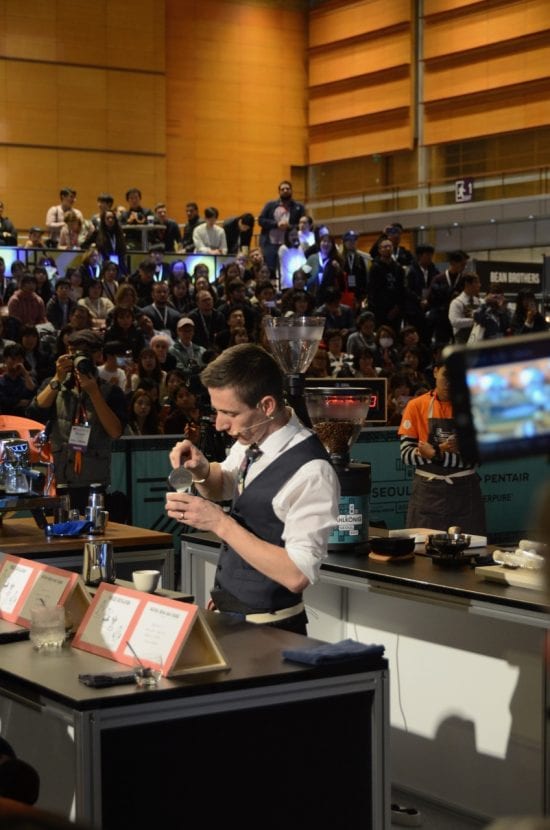
I only had 10 days to prep for WBC after nationals, which was pretty crazy–especially as I roasted all of my coffee on an IKAWA sample roaster, 50g at a time. Lots of late nights. I changed my speech, my signature drink, and my table setup—due to logistical challenges, I wasn’t able to practice with that setup, so my first set at WBC was the first run-through with the setup.
AR: You did something unique with your milk for the milk course. Could you tell us about that?
BP: The milk technique is so easy that it is a little laughable (most of my competition ideas are very DIY). In the café, we differentiate milk by its fat content: whole milk, 1 percent, skim, and cream. This variety isn’t necessarily what is best for coffee, it is what milk producers give us and we work with it. I have never enjoyed really fatty milk or really milk drinks, because they always taste out of balance. I realized that the fat content of the milk might be changing, but the sugar content never changed by much. Freeze distillation is a fancy way to say that I froze the milk, turned the carton upside-down, and let it partially thaw in a jar. Sugars, fats, and proteins will melt first and drip out of the frozen milk until you have just cloudy ice left. I mixed the concentrated milk with regular milk at a 1:1 ratio. I love this technique because it is something everyone can try for themselves, which is a rare thing at WBC.
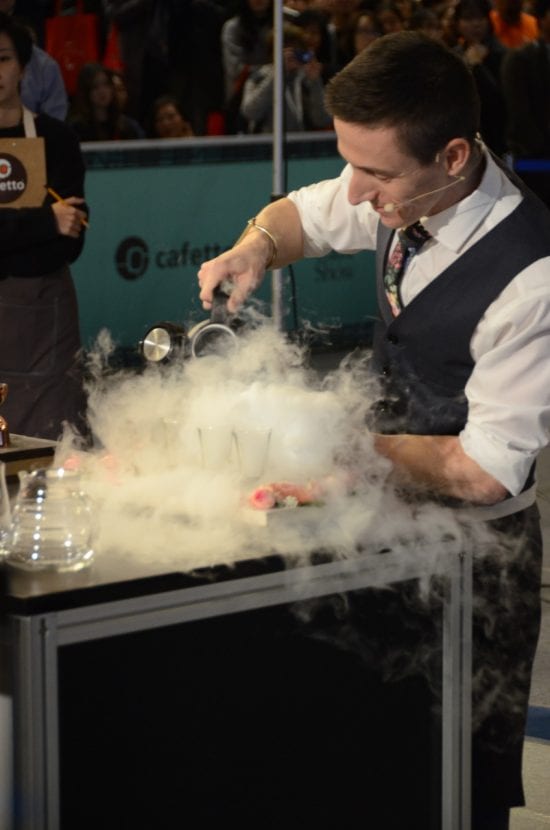
AR: What would you like to see change about competition?
BP: One thing that I would like to see change is the way that competition knowledge moves from country to country and competitor to competitor. It is really hard to learn the ins and outs of competition at a really high level; it took me five years to make WBC and six years to make the finals because competition was my primary method of learning. One way to shorten this learning period is to have a coach, but that is expensive. This means that the countries and competitors who receive knowledge generally have more money. I would love to see competition knowledge move more generally throughout the whole world. I will be the first to admit I haven’t done as much as I should to change this, and I don’t have clear ways to change this. I also think that there is nothing wrong with a competitor having the funds to invest in competition, and I think it is amazing when businesses invest money in their staff with no guarantee of a monetary reward.
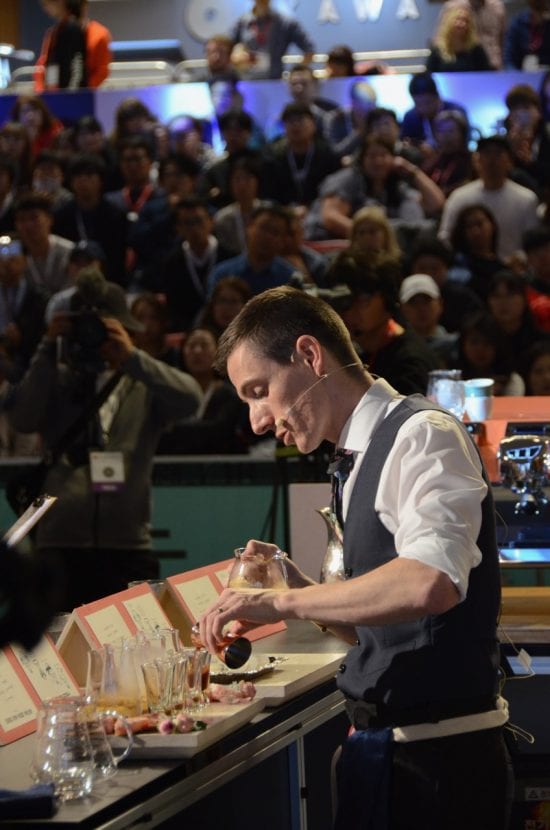
I believe that competition is one of the most powerful ways for a barista to carve out a career path. While this is great for baristas who are drawn to competitions and do well in them, it leaves a lot of people without a clear path to coffee as a career. It is not a slight on competitions, but I believe that it points to a need for other avenues of career development.

